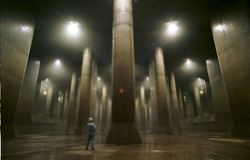Tom Moon (audio):
To announce its latest release How to Dismantle an Atomic Bomb, U2 has partnered with Apple Computer for a series of now-ubiquitous television advertisements.
Tom Moon (audio):
To announce its latest release How to Dismantle an Atomic Bomb, U2 has partnered with Apple Computer for a series of now-ubiquitous television advertisements.
Brad Livingston, Director of the Dane County Regional Airport sent me this note today regarding their plans for WiFi (Wireless Internet) access. Let’s hope this happens as it has been a long time coming. Meanwhile, IATA Director-General Giovanni Bisignani is taking on the monopoly, high margin suppliers around the air transport industry. The Economist takes a look at Bisignani’s interesting initiatives.
Next time you make a printout from your color laser printer, shine an LED flashlight beam on it and examine it closely with a magnifying glass. You might be able to see the small, scattered yellow dots printer there that could be used to trace the document back to you.
According to experts, several printer companies quietly encode the serial number and the manufacturing code of their color laser printers and color copiers on every document those machines produce. Governments, including the United States, already use the hidden markings to track counterfeiters.
Ed Driscoll covers Tom Wolfe’s recent speech at San Francisco’s Herbst Theatre. Wolfe was introduced by Michael Lewis, author of the excellent Liar’s Poker and Moneyball among other interesting books. Wolfe spoke about his new book: I am Charlotte Simmons.
Josh Marshall on the congressional republican’s hubris:
This weekend Congress was working on a massive $388 billion omnibus spending bill that will cover all manner of federal spending. But at the request of Rep. Ernest Istook of Oklahoma, chairman of the House Appropriations Transportation Subcommittee, a special provision was inserted into the bill which allows the Chairmen of the House and Senate Appropriations Committees or their “agents” to review any American’s tax return with no restrictions whatsoever.
Paul Graham writes about things we Americans are good at and not so good at….
Americans are good at some things and bad at others. We’re good at making movies and software, and bad at making cars and cities. And I think we may be good at what we’re good at for the same reason we’re bad at what we’re bad at. We’re impatient. In America, if you want to do something, you don’t worry that it might come out badly, or upset delicate social balances, or that people might think you’re getting above yourself. If you want to do something, as Nike says, just do it.
This works well in some fields and badly in others. I suspect it works in movies and software because they’re both messy processes. “Systematic” is the last word I’d use to describe the way good programmers write software. Code is not something they assemble painstakingly after careful planning, like the pyramids. It’s something they plunge into, working fast and constantly changing their minds, like a charcoal sketch.
Graham makes some useful points.

Tokyo’s massive underground water system.

Liane Hansen interviews acoustic guitar queen Kaki King.
At one level, the debate is over current controversies in public education: Many parents believe that their children, mostly in elite schools, are being pushed too hard in a hypercompetitive atmosphere. But other parents are complaining about a decline in programs for gifted children, leaving students to languish in “untracked” and unstimulating classrooms. Some critics of education believe that boys especially are languishing in schools that emphasize cooperation instead of competition. No Child Left Behind, indeed.
But the basic issue is the same one raised four decades ago by Kurt Vonnegut in “Harrison Bergeron,” a short story set in the America of 2081, about a 14-year-old genius and star athlete. To keep others from feeling inferior, the Handicapper General weighs him down with 300-pound weights and makes him wear earphones that blast noise, so he cannot take “unfair advantage” of his brain.
That’s hardly the America of 2004, but today’s children do grow up with soccer leagues and spelling bees where everyone gets a prize. On some playgrounds dodge ball is deemed too traumatic to the dodging-impaired. Some parents consider musical chairs dangerously exclusionary.
Fascinating article….
 |
 |
 |
 |
 |
 |
Click to view larger photos.
Dinner at LuLu’s, the Madison Symphony at the Overture and a walk around the Square.